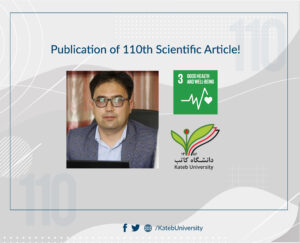In order to achieve Sustainable Development Goals (SDGs3: Health and Well-Being), scientific article by Dr. Rohullah Roein, lecturer at Kateb Medicine Faculty and research at Kateb Research Center, in collaboration with his research team, entitled “Prevalence and determinants of self-medication with antibiotics among general population in Afghanistan” was published in the international prestigious journal of “Expert Review of Anti-infective Therapy”. It is worth mentioning that this article was published with an impact factor of 5.1 and was published with the publication of “Tylor & Francis”.
This research paper is about the prevalence and the factors of determining the arbitrary use of antibiotics in Afghanistan.
A summary of the important findings of this scientific article is as follows:
1. Antibiotic resistance is one of the major health problems in the world that is spreading rapidly and causes death, disability and many other problems. According to research and forecasts, if this situation continues, the health and economic costs of antibiotic resistance will be more than 10 million deaths and more than $100 trillion lose worldwide by 2050.
2. Antibiotic resistance will lead to unsuccessful treatment of infectious diseases, increase health costs and increase economic, social and health problems. Various factors have been suggested for antibiotic resistance, among which the arbitrary use of antibiotics is one of the most important factors.
3. Use of antibiotics to treat diseases we have diagnosed ourselves, use or prescribe medication to others, use leftover medications, repeat previous prescriptions, and change medication dosages without consulting a doctor or health care professional are considered as arbitrary use of antibiotics.
4. Afghanistan is one of the countries with the highest rate of antibiotic use, and among these, the arbitrary use of antibiotics is very high, so that among the participants in this study, 73.2% of them at least once in the past year antibiotics are used arbitrarily.
5. Only 62.2% of people who used antibiotics arbitrarily were very concerned about this treatment. 40.5% of them described the arbitrary use of antibiotics as a wrongdoing.
6. Penicillin, metronidazole and ceftriaxone, tetracycline, azithromycin, cefixime, ciprofloxacin and erythromycin are among the most commonly used antibiotics for arbitrary use.
7. Economic problems, not having enough time to go to health centers, ease of purchasing and availability of antibiotics, lack of trust in health centers and personnel, lack of health centers and low quality of health services were among the most important factors in the arbitrary use of antibiotics.
8. The results of this study and the high prevalence of arbitrary use of antibiotics in Afghanistan require careful planning to increase public awareness about antibiotics, drug resistance and its problems, preparation, amendment and implementation of procedures, bills and laws import, distribution, access and sale of antibiotics, precise and continuous control of pharmacies and prevention of sale of antibiotics without a prescription and doctor’s advice, etc.
Interested people can find the article here.

Sharing: